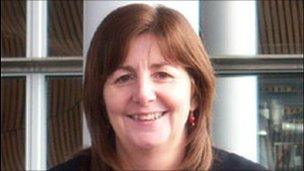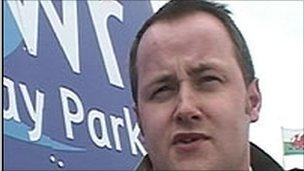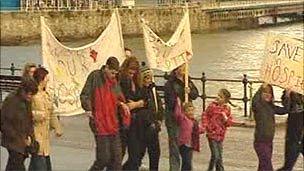The third rail of Welsh politics
- Published
- comments

Lesley Griffiths is awaiting proposals for major changes to the NHS
The Americans have a political concept called the "third rail". Derived from the electrified rail on metro trains, it's used to describe an issue so deadly that just touching it can result in sudden political death.
In Westminster, it's immigration. In Wales, it's health. The then Minister Brian Gibbons found that out when he commissioned a review into hospital reconfiguration which reported just months before the 2007 Assembly election. Less a case of be careful what you wish for, than be very, very careful what you wish for just before an election.
The review not surprisingly recommended centralisation of many specialist services away from local hospitals to deliver more efficient and safer care for patients.
Labour were duly hammered at the ballot box - Plaid Cymru in particular cannily putting up candidates standing on tickets such as "Plaid Cymru - Save Llandudno Hospital".
On a political level, the timing of Dr Gibbons' review was an error of epic proportions. Barely a day of that campaign passed without the words "health" and "protest" passing my lips. Yet in reality, virtually anyone who knows anything about the way the health service is structured, both within and without, Labour-friendly or not, will tell you that there was - and still is - an urgent need for change.
That need for change is about to come to a head in the next few weeks, when each of Wales' Local Health Boards submit their reconfiguration plans to the new Health Minister, Lesley Griffiths. Such is the financial crisis facing the NHS in Wales over the next few years that change is pretty much inevitable now. The music's stopped and it's stopped on her watch.
Which is why we get news today of a National Clinical Forum - an independent group of clinicians to scrutinise the LHBs' plans. According to the Welsh Government it will "give independent advice to Local Health Boards on their plans to ensure that they stood up to clinical best practice and delivered services of the highest quality".
The idea, we're told, is to take politics out of the highly emotive issue of health reconfiguration. Lesley Griffiths says it's too important to become a "political football" and should be "free from political point-scoring".

Shadow Health Minister Darren Millar
A government figure I bumped into yesterday evening had a somewhat different take on the NCF, mind you. What's this forum all about then, I asked? "It'll shoot Darren Millar's fox, won't it? Is he a clinician? No. So what does he know?" came the response.
The Shadow Health Minister would probably argue that he knows a fair bit, incidentally.
So is the tactic here to set up the NCF as political cover for some very, very tricky decisions which are coming down the track - a firebreak against the opposition parties' anger? The Minister can stand up and say - yes, I understand there are local concerns, but the NCF have assured me that this is the best way forward and they should know.

Protesters at the downgrading of Llandudno hospital
But let's just raise a couple of issues here. The health service doesn't operate in an apolitical bubble. As we saw in 2007, people really care about their local hospital and what level of service is available to them there. They look to their local elected representatives to speak up for them on their behalf. If they're to be dismissed simply as "not clinicians" - and if you do that to the opposition, you must do it to your own side too - then what price democracy?
The description of the body as "independent" is intriguing too. It will be chaired by the Medical Director of NHS Wales, and include representatives from various advisory committees and Royal Colleges, people who absolutely know their stuff. But where are the Community Health Councils, the patients' watchdogs? Where are the objective, authoritative voices, familiar to viewers and listeners to BBC Wales - Professors Marcus Longley, Ceri Phillips, Siobhan McClelland? Or would that be taking the tag "independent" too literally?
It's often been in the Government's interest to portray the NHS as somehow separate from them, the more so when unpopular decisions have to be made. But it's not separate - the NHS is the health department of the Welsh Government, don't forget. They pay the bills, they set the strategy and the targets, the Director General for Health of the Welsh Government is also the Chief Executive of NHS Wales.
In the last resort, forum or no forum, the buck stops with the Health Minister. She knows it's for her to front up when changes are made and tell people why they're happening.
So when the going gets tough, expect the NCF to take centre stage amid bitter rows in every corner of Wales. But will it be known as the National Clinical Forum - or Not Cardiff's Fault?